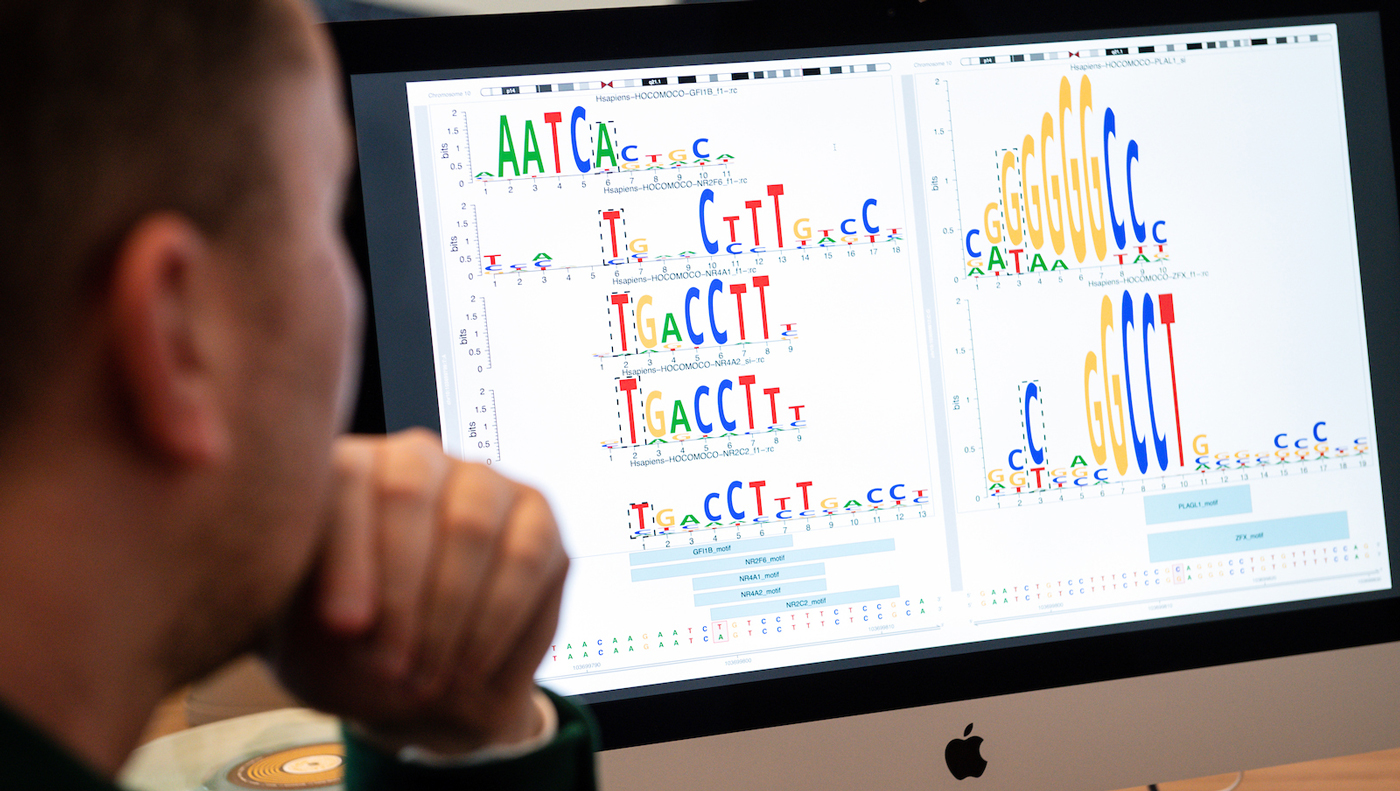Katie Pollard and her team develop models that enable them to decode how genomes work, evolve, and break in disease. Their analyses of massive sets of genomic and epigenomic data include investigating human genetic variation, understanding what makes humans unique compared to other species, and characterizing the genomic diversity of the human microbiome, the group of bacteria that populate our digestive system and other body sites. An evolutionary focus, coupled with rigorous statistical methods and bioinformatics tool development, gives the lab a unique perspective on human biology and disease.
Disease Areas
Areas of Expertise

Lab Focus
Research Impact
Pollard pioneered a statistical approach to identify the fastest-evolving regions of the human genome, known as Human Accelerated Regions (HARs). Her team showed that many of these correspond to non-coding sequences controlling the expression of genes important for development and associated with psychiatric disorders. The lab also used machine learning to reveal the importance of DNA shape and folding in gene regulation. These studies have generated research tools for studying human disease that are yielding novel therapeutic targets.
Pollard has also designed metagenomic-based methods to study the human microbiome at the resolution of individual genes and genetic mutations. From these studies, novel insight will arise into the relationship of the microbiome to health and disease, setting the stage for using metagenomics in precision medicine.
The Pollard Lab’s open-source code for gene expression analysis, detecting evolutionary conservation and acceleration, and quantifying genetic changes in the human microbiome is used in thousands of labs and classrooms.
Professional Titles
L.K. Whittier Director, Gladstone Institute of Data Science and Biotechnology
Senior Investigator, Gladstone Institutes
Professor, Department of Epidemiology and Biostatistics, UC San Francisco
Director, Biomedical Informatics Graduate Program, UC San Francisco
Investigator, Chan Zuckerberg Biohub San Francisco
Bio
Computational biology, which empowers scientists to draw new insights from massive amounts of data, is Katie Pollard’s métier. She earned her PhD in biostatistics at UC Berkeley, then completed a postdoctoral fellowship at UC Santa Cruz, where she worked with David Haussler, the renowned bioinformatician who led the team that assembled the first human genome sequence. During her fellowship, Pollard discovered rapidly evolving regions in the human genome that may help explain the emergence of brain capabilities unique to humans and may also point to their vulnerability to neurological diseases. After serving as an assistant professor at UC Davis, Pollard joined Gladstone in 2008. She was appointed founding director of the Gladstone Institute of Biotechnology and Data Science in 2018.
In her work, Pollard designs computer programs that can test a million or more hypothetical experiments in a day to predict outcomes. This approach helps identify and prioritize which research avenues performed in a lab are most likely to lead to success, increasing efficiency and speeding discovery.
Her team is recognized for both its rigor to the field of genomics and for its generosity: the open-source software they create is readily shared with scientists around the world. Pollard herself is a dedicated mentor who takes pride in equipping women and other underrepresented groups in science with the skills and training to launch successful careers—and encourages them to extend the practice to the next generation.
Pollard also lends her expertise as an advisor to research programs across the country, including those at the Simons Foundation, The Rockefeller University, and Stanford University, and to biotechnology companies such as Phylagen and Tenaya Therapeutics.
What are you most excited about in your lab right now?
“It is such a thrill that we can now rapidly screen trillions of causal hypotheses about genetic diseases using AI models built in our lab This pushes us to take risks and enables us to prioritize the experiments that are most likely to yield new discoveries.”
Honors and Awards
2023 Fellow, American Association for the Advancement of Science
2022 Elected member, National Academy of Medicine
2021 Fellow, American Institute for Medical and Biological Engineering
2020 Fellow, International Society for Computational Biology
2018 Named to “San Francisco Business Times’” list of “Women Who Lead in the Life Sciences”
2018 Named to UC Berkeley School of Public Health’s list of “75 Most Influential Alumni”
2017 Named a Chan-Zuckerberg Biohub Investigator
2013 Fellow, California Academy of Sciences
2013 Alumna of the Year, UC Berkeley School of Public Health
2013 Best Scientific Visualizations of the Year, “Wired” Magazine
2009 Breakthrough Biomedical Research Award, UC San Francisco
2008 Sloan Research Fellowship, Alfred P. Sloan Foundation
2007 Faculty Development Award, UC Davis
2003 Evelyn Fix Memorial Prize, Chin Long Chiang Biostatistics Student of the Year, UC Berkeley
1998 Berkeley Fellowship, UC Berkeley
1996 Thomas J. Watson Fellowship, Watson Foundation
1995 Valedictorian, High Scholarship Prize, Math Prize, Anthropology Prize, Phi Beta Kappa Award, Pomona College
1993 Sophomore Math Prize, Pomona College
Publications
Contact
Katie Pollard
Email
415.734.2711
Zainab Yusuf-Sada
Senior Executive Administrator
415.734.4827
Email

